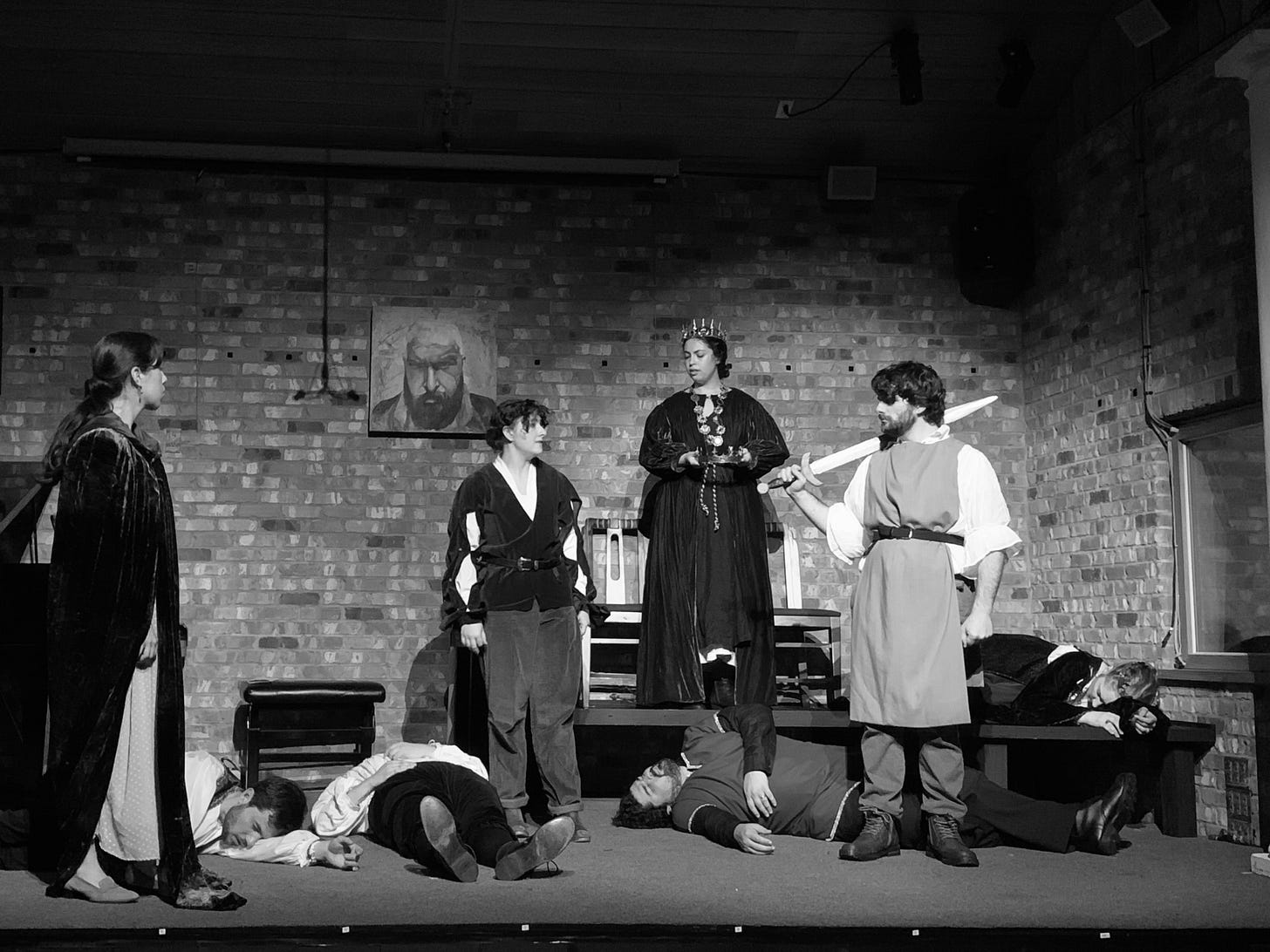England and Norway stride in to a narrow brick room. They mount the steps of a raised platform that signifies “show,” and cross the impossibly small stage littered with four bodies. They survey the wreckage—of two dynasties, of two families, of a nation. This is Hamlet. This is always Hamlet. Could any one be surprised by the ending of Shakespeare’s best (or worst?) play? No. We know the fate of Hamlet the Dane, his villainous uncle Claudius, the broken Ophelia, the complicated and always receding Gertrude; we know it before the curtain rises, or in the case of Michael McNamara’s straightforward staging of this old story, before the lights shift and the eclectic sound design begins. But McNamara’s take has some new things to see, and is well worth the price of admission. In a rough-and-ready Shakespeare with a young cast, there are some nice surprises for us weary elder statesmen—of the theatre, of the city beautiful, of America.

When I heard that one of my former students, Michael McNamara, would be directing Hamlet at the Timucua Arts Foundation’s White House, I knew I would go see it, and I made it to a dress rehearsal. I also thought I might audition for Gertrude, a character I’ve always found intriguing because she does not say much and yet is always situated at the center of the action. But I’m glad I didn’t. The production featured many young actors in the iconic roles, directed well by McNamara in a production that gallops through all of the major plot points barely pausing for breath, thanks to some judicious trimming and rearrangement of the text. With so much youth on stage, my world-weary Millenial interpretation of the complicated queen would compete with the Gen. Z ambivalence toward “great narratives” brought forward by the nontraditional casting, the anachronistic costuming, the musical mixing of genres in the sound design, and the deeply ironic and noncommittal Hamlet played by a very promising new face to the Orlando arts scene, Sara BenBella.
Following the rehearsal, I talked with McNamara, who spoke of his inspiration for the direction:
“Elizabethan theatre had no fourth wall, so the audience and actors were constantly connected and playing off each other. I wanted to capture that with our production. Timucua is a wonderfully intimate space, with the potential to tell this story on all sides of an audience. I hope that by trying to immerse viewers in the story, not just as voyeurs but as actual parts of the world or figments of the character’s minds, modern audiences will feel a similar sort of excitement and draw that Shakespeare’s audiences would have.”
At Timucua’s white house venue, you will not have any refuge behind an imagined fourth wall; the actors comes from the aisle, from the lobby, they ascend the spiral staircase to the balcony. BenBella as Hamlet engages the audience openly, speaking straight to me as if maybe I had the answers. Despite their beseeching gaze, each of the famous seven monologues ultimately ends in a jumble of “words, words, words.” Having been raised on the great film performances of Hamlet from Olivier, to Branagh, to Tennant, I felt deep unease in BenBella’s choice to withhold their craft at the end of the monologue, letting it trail off like so much AI-generated word salad, and the choice made me think about the speeches in a new way. Because really…Hamlet’s speeches tend toward “nothing.” The pleading eye contact amplified the effect of my powerlessness to “speak” anything true to a young adult who looks around himself and finds “there’s nothing either good or bad but thinking makes it so.”
The production features excellent turns by actors in the supporting roles, including an appropriately pompous and tone deaf Dene Gainey as Polonius and a Rosencrantz and Guildenstern (played by Paula Espinosa and Joe Kolasa, respectively) who tell a physical story of complicity and deception at the same time that their cluelessness about their place in the plot endears them to us. Marina Russell delivers heartbreaking final words as a Horatio powerless to stop the violence. Brenna Arden has the resonant voice and statuesque carriage of a classic film star and makes bold choices as Gertrude.
The scenic design is unfortunately limited by the restrictions of the space, the beautiful Timucua Arts Foundation’s “white house.” McNamara incorporates a baby grand piano into the action, but one knows that the piano must have confronted the creative team with a challenge as uncomfortable as the one the Ghost poses to Hamlet (speaking of the Ghost, McNamara’s choice in staging the Ghost was far and away my favorite element of the show). Parking was relatively easy to find on the street. Timucua Arts allows you to bring in your own wine and leave some to share or to enjoy complimentary wine or non-alcoholic beverages brought by other patrons.1 The Timucua space has sound support so advanced you can hear the actor’s whisper a line with perfect clarity while preserving the naturalness of the voice. The lines are delivered with excellent enunciation of speech and intelligence, so if you are excited to hear a Hamlet you can actually understand, go see this one before it closes this weekend.
Tickets can be found here.
Showtimes: June 20 at 7:30 om; June 21 at 2:30 and 7:30 pm and June 22 at 7:30 pm
Run time: The show runs approximately 2 and a half hours, with two intermissions for a total of time of about 2 hours and 50 minutes.
You can read about the BYO/enjoy a drink policies here: https://timucua.com/faqs/



